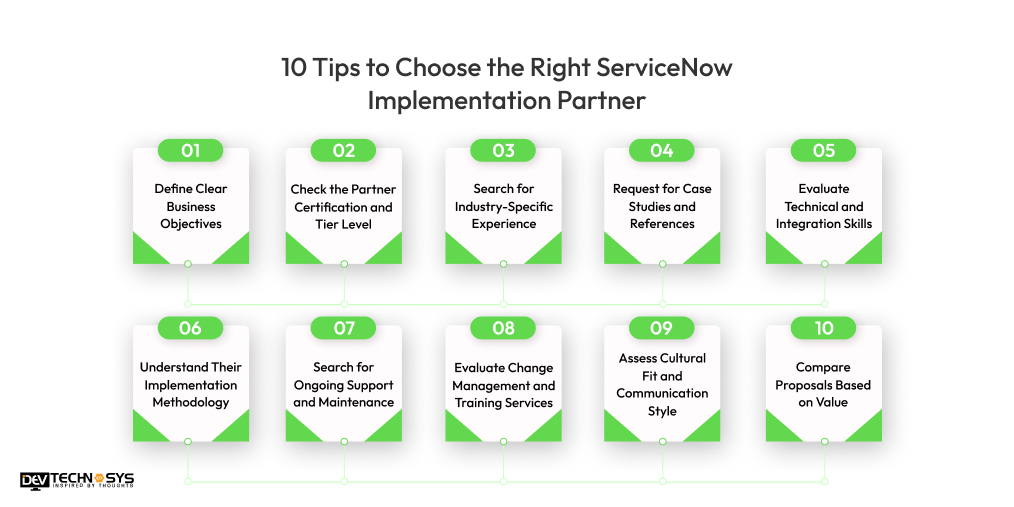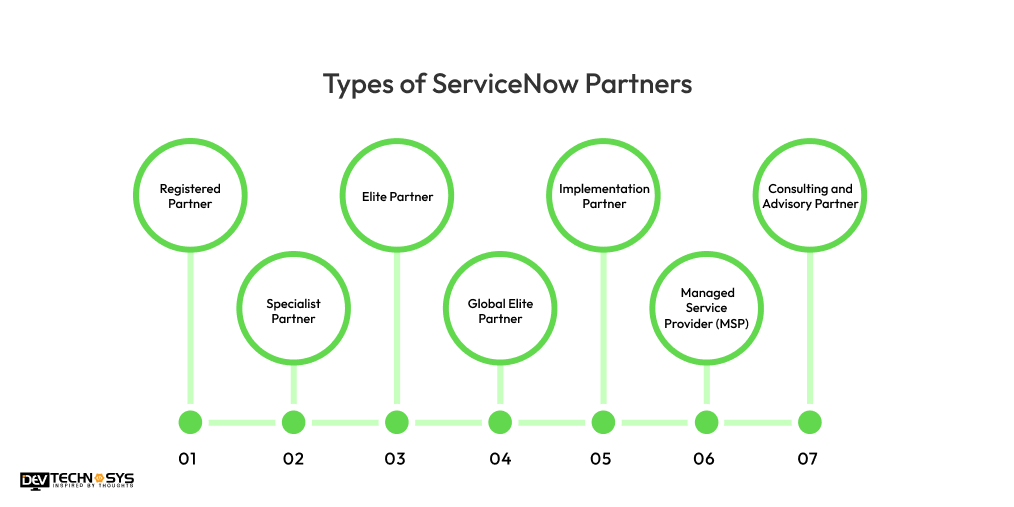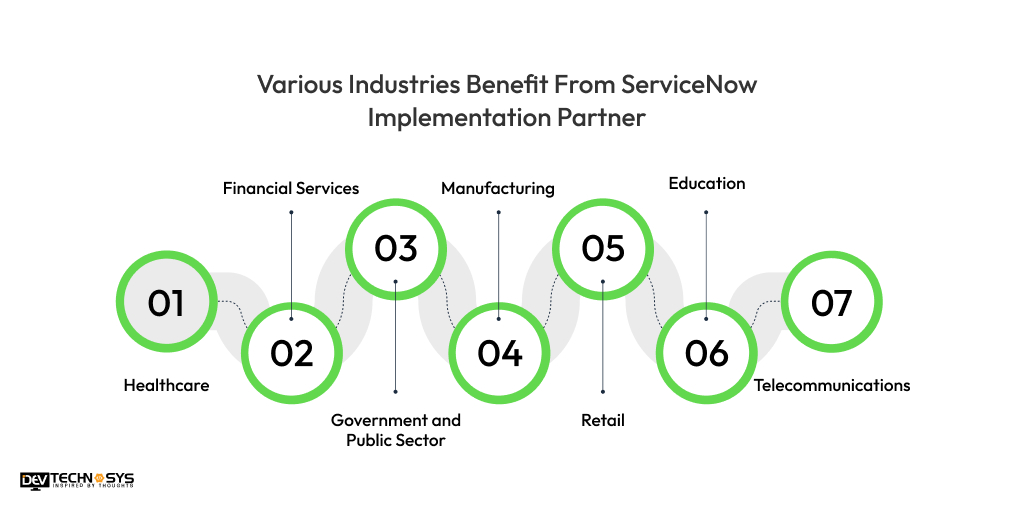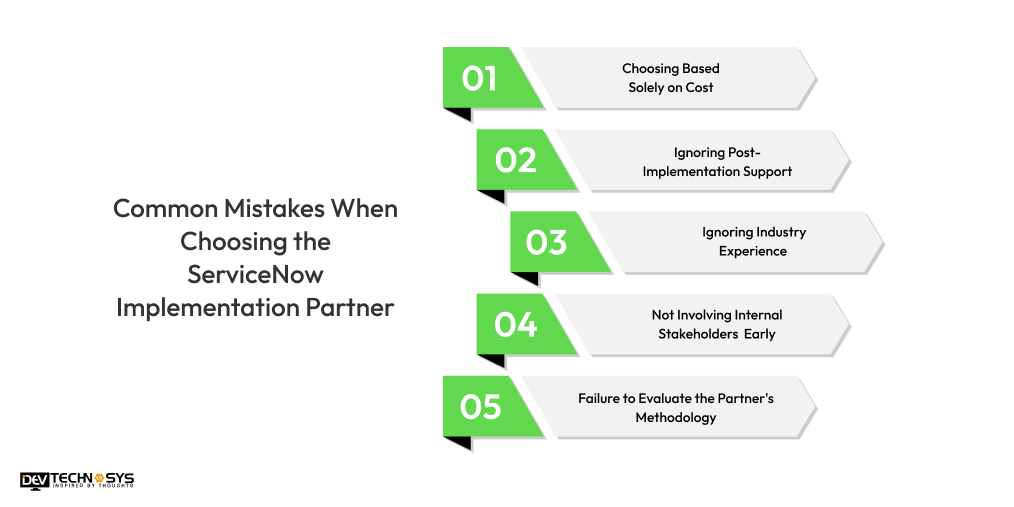In this high-tech world, ServiceNow unlocked efficiency and productivity for thousands of businesses and offers streamlined business operations to achieve their specific goals. Most of today’s businesses want to implement ServiceNow services to enhance their businesses and receive digital workflows.
Look what I found, the ServiceNow market was valued at around $12.68 billion in 2025, and it is projected to increase to around $15 billion by the end of 2026.
This data shows how rapidly ServiceNow services are growing, and it was founded in 2004 by Fred Luddy with just one laptop.
Today’s business wants to implement ServiceNow, but they don’t know how to choose the right ServiceNow implementation partner. No need to worry about it. Just continue to read this blog.
Importance of ServiceNow for Digital Transformation
ServiceNow plays an important role in digital transformation by allowing enterprises to automate, simplify, and optimize workflows across departments. As a cloud-based platform, it consolidates corporate operations including IT, HR, customer service, and security into a single system of record, minimizing silos and increasing cooperation.
By automating manual processes and connecting diverse resources, business needs a ServiceNow expert to improve operational efficiency, service delivery, and user experiences.
10 Tips to Choose the Right ServiceNow Implementation Partner
Selecting the correct ServiceNow implementation services partner is critical to the success of your digital transformation project. A knowledgeable and experienced partner can help you avoid costly mistakes, expedite value realization, and guarantee that your workflows are matched to your organization’s particular requirements. Here are some important suggestions on the ServiceNow partner selection guide:

1. Define Clear Business Objectives
Begin by defining your goals using ServiceNow, such as boosting IT service delivery, automating HR procedures, or improving customer support. A well-defined aim allows potential partners to adjust their approach and assures compatibility with your company’s mission.
Clarity at this point also facilitates subsequent success measurement and reduces scope creep during implementation.
2. Check the Partner Certification and Tier Level
Choose a Servicenow managed services-certified partner. Look for those in the Specialist, Elite, or Global Elite levels, which indicate their experience, technological capabilities, and customer success track record.
These partners often have trained expertise, a proven track record, and exclusive access to resources. Certification confirms that your partner follows best practices and has been reviewed by ServiceNow.
3. Search for Industry-Specific Experience
A partner with industry expertise knows your regulatory environment, procedures, and unique difficulties.
Whether you work in healthcare, banking, manufacturing, or government, industry experience enables the partner to provide more relevant recommendations, decrease customization time, and ensure compliance. It also results in speedier deployment and increased acceptance rates because of familiarity with your operating system.
4. Request for Case Studies and References
Always obtain case studies or project descriptions from comparable clients. Speak directly with former clients to gain a feel of the partner’s dependability, problem-solving abilities, and communication style.
Good partners will happily provide references and explain how they have achieved meaningful commercial results. This real-world experience helps to decrease risk and boosts confidence in your decision.
5. Evaluate Technical and Integration Skills
Hire Servicenow developers to ensure that the partner has certified specialists in the specific ServiceNow modules you intend to install, such as ITSM, HRSD, or CSM.
They should also be able to integrate well with your existing systems (such as ERP, CRM, and identity platforms). A well-integrated platform provides a consistent user experience while preventing new data silos inside your business.
6. Understand Their Implementation Methodology
Inquire about their project delivery method—Agile, Waterfall, or hybrid. Consider how they handle scope, adjustments, timeframes, and testing. Checkpoints, stakeholder participation, and quality assurance are all essential components of a robust approach.
Look for partners who provide accelerators or reusable components to reduce time-to-value while adhering to ServiceNow’s deployment best practices.
7. Search for Ongoing Support and Maintenance
A strong partner does not abandon the project after it has gone live. Servicenow support services provide hypercare, continuing support, platform upgrades, and performance tweaking.
Long-term support guarantees that your instance evolves in accordance with your business demands. Managed services can also help you decrease internal effort and get the most out of your ServiceNow investment over time.
8. Evaluate Change Management and Training Services
The quality of training and support provided to your users is critical to successful adoption. Partners should provide change management strategies, training, and user documentation.
These services serve to eliminate resistance, boost user confidence, and assure the platform’s maximum effect. A partner who addresses both the technical and human sides of transformation is significantly more beneficial.
9. Assess Cultural Fit and Communication Style
Beyond technical skill, cultural compatibility is important to choose ServiceNow Partner. Pay attention to how your spouse communicates, collaborates, and responds to feedback.
Are they responsive, transparent, and proactive? A solid working connection, common values, and effective communication are critical for overcoming obstacles and sustaining project momentum throughout the engagement.
10. Compare Proposals Based on Value
Don’t accept the lowest bid. Instead, assess bids based on their entire value, including experience, methodology, team quality, post-go-live support, and business alignment. Use a grading system to objectively evaluate crucial aspects.
IT service management will provide strategic insight, long-term cooperation, and demonstrable results, not simply a quick, low-cost execution.
Types of ServiceNow Partners
ServiceNow partners are critical to helping enterprises install, configure, and expand the platform. These partners are divided into many categories based on their specialty, qualification level, and services offered. Understanding the various sorts of best ServiceNow partners can assist you in determining which is most appropriate for your organization’s requirements.

1. Registered Partner
Registered partners are best ServiceNow partners who are new to the platform and lack certifications. Strategic portfolio management serve small-scale deployments or clients that are just starting out with ServiceNow.
While they may not have a vast portfolio, they can provide cost-effective services for basic needs and are frequently seeking to establish trust in a certain sector or location.
2. Specialist Partner
Specialist partners have proven competence in particular ServiceNow modules or sectors. They hold many qualifications and can handle relatively difficult installations.
These partners are appropriate for enterprises looking for specific solutions, such as ITSM or HR service delivery, as they often contribute more organized procedures and deeper functional knowledge than registered partners.
3. Elite Partner
Elite partners have extensive expertise with large-scale ServiceNow implementations. ServiceNow service portal employs a large number of qualified people across many products and provides comprehensive services such as implementation, consultation, and integration.
Elite partners are ideal for business customers seeking strategic assistance, robust governance, and a track record of successfully executing difficult digital transformation projects.
4. Global Elite Partner
worldwide Elite partners are ServiceNow’s top-tier partners, distinguished by their worldwide delivery capabilities and strategic partnership with ServiceNow. They oversee enterprise-wide reforms and collaborate on sophisticated solutions.
These partners, with deep knowledge, broad certifications, and worldwide reach, assist multinational organizations in achieving scale, innovation, and long-term platform evolution.
5. Implementation Partner
Implementation partners work on delivering and configuring ServiceNow systems. They are in charge of planning, designing, developing, testing, and providing go-live support.
ServiceNow migration services offer process expertise and technical skills to help transform business needs into functional workflows. Ideal for enterprises that want to start or extend ServiceNow across business departments or functions.
6. Managed Service Provider (MSP)
MSPs provide continuous administration, monitoring, and optimization for your ServiceNow infrastructure. They provide ongoing platform support, incident response, updates, and enhancements.
MSPs are ideal for firms that lack internal ServiceNow experience, since they assure long-term performance and stability while minimizing the workload on internal IT teams.
7. Consulting and Advisory Partner
These partners offer strategic recommendations for leveraging Servicenow consulting services to promote digital transformation. They contribute to the definition of vision, process alignment, KPI setting, and roadmap planning.
They frequently assist you in designing a scalable ServiceNow strategy prior to implementation. Best ServiceNow consulting firms want to integrate their business goals with platform capabilities.
| Type | Focus Area | Best For |
| Registered | Entry-level delivery | Small businesses |
| Specialist | Module-specific expertise | Mid-sized projects |
| Elite | Complex implementations | Large enterprises |
| Global Elite | Full-scale transformation | Multinational organizations |
| Implementation Partner | Technical deployment | All business sizes |
| MSP | Ongoing support | Organizations with limited in-house IT |
| Consulting Partner | Strategic planning | Long-term transformation |
Various Industries Benefit From ServiceNow Implementation Partner
Discover how businesses in healthcare, finance, government, retail, manufacturing, education, and other industries can improve operational efficiency, regulatory compliance, and service delivery by collaborating with certified ServiceNow experts to implement customized digital workflows and ServiceNow transforms IT operations.

1. Healthcare
Certified ServiceNow partners assist healthcare providers with streamlining patient services, managing compliance (e.g., HIPAA), and improving IT support for clinical systems.
By automating workflows and connecting health data systems, partners may improve patient experiences, minimize administrative costs, and improve data security across hospitals, clinics, and research organizations.
2. Financial Services
In banking and insurance, ServiceNow consulting partners simplify regular processes, improve customer service, and ensure compliance with tight requirements such as SOX and PCI-DSS.
Their knowledge lowers operational risk, enhances incident response, and fosters a safe, streamlined environment that increases efficiency and consumer trust in financial institutions.
3. Government and Public Sector
ServiceNow partners help government agencies digitize citizen services, ensure regulatory compliance, and modernize out-of-date systems. Partners provide secure installations that are tailored to the demands of the public sector, allowing for speedier service delivery, more data openness, and increased departmental collaboration—all while maintaining within budget and compliance parameters.
4. Manufacturing
Manufacturers utilize ServiceNow partners to automate maintenance, manage supply chains, and improve IT operations. Partners also offer real-time equipment monitoring and quick problem response, which reduces downtime.
According to the ServiceNow implementation company, manufacturers may save money, stay compliant, and boost efficiency across production lines and facilities by improving workflow integration and operational visibility.
5. Retail
ServiceNow partners help retailers improve inventory management, customer service, and back-office operations. Partners contribute to the integration of in-store and digital platforms, increasing employee productivity and providing speedier service.
This unified strategy improves consumer experiences while streamlining retail operations, logistics, and vendor interactions.
6. Education
Educational institutions profit from strengthening student support services, automating administrative activities, and simplifying IT help desks.
Certified ServiceNow partners provide solutions for onboarding, facility management, and staff support, resulting in a more effective learning environment. These advancements assist schools and universities in lowering operating expenses while increasing student and teacher satisfaction.
7. Telecommunications
Telecom firms rely on ServiceNow partners to automate service requests, manage outages, and improve infrastructure support. Partners offer integration with network monitoring tools and CRM systems, which improves customer experience and service availability. They also enable ticket resolution, workforce scheduling, and compliance, allowing telecom companies to operate more effectively at scale.
Common Mistakes When Choosing the ServiceNow Implementation Partner
Avoid costly setbacks and unsuccessful implementations by learning about the most common mistakes organizations make when choosing a ServiceNow partner, such as focusing solely on cost and forgetting post-go-live support and stakeholder involvement, and how to make the correct decision.

1. Choosing Based Solely on Cost
Opting for the cheapest partner may appear cost-effective at first, but it frequently results in bad outcomes such as postponed schedules, technical debt, or rework. Low-cost vendors may lack the extensive experience, credentials, and industry knowledge required for sophisticated installations. Prioritize overall value, including quality, support, and long-term ROI, over price.
2. Ignoring Post-Implementation Support
ServiceNow is not a “set it and forget it” platform. Organizations frequently underestimate the value of continuing support, upgrades, and platform optimization.
A strong partner should provide managed services, health checks, and upgrade help to keep your instance secure, scalable, and in line with changing business requirements.
3. Ignoring Industry Experience
Not all partners are aware of your specific regulatory, operational, and compliance requirements. Choosing a partner without sufficient industry experience may result in a generic solution that does not fit your business procedures.
Always look for partners who have successfully implemented ServiceNow in your sector or a comparable setting.
4. Not Involving Internal Stakeholders Early
Excluding important business and technical stakeholders from the partner evaluation process may result in a misalignment between the platform’s capabilities and actual business requirements.
Engaging users, department heads, and IT leaders ensures that the selected partner knows the project’s requirements, promotes buy-in, and improves implementation success.
5. Failure to Evaluate the Partner’s Methodology
A failure to consider how a partner plans, executes, and governs projects is a key flaw. Without a proven implementation methodology—whether Agile, Waterfall, or hybrid—projects may experience scope creep, missed deadlines, and unclear deliverables.
Request a detailed delivery strategy, project governance approach, and success measures before signing.
Conclusion
Selecting the right ServiceNow implementation partner is a crucial step toward maximizing the platform’s potential. A qualified ServiceNow development company brings the technical expertise, industry knowledge, and strategic insight needed to align the platform with your business goals.
From planning and customization to integration and ongoing support, the right partner ensures a smooth, efficient deployment. Avoid common mistakes by evaluating certifications, client references, and long-term support capabilities. Choosing the right ServiceNow development company not only accelerates your digital transformation but also sets the foundation for scalable, future-ready operations.
Frequently Asked Questions
1. Why Do I Need a ServiceNow Implementation Partner?
A ServiceNow implementation partner provides certified skills, proven methodology, and industry-specific experience to ensure a seamless and effective deployment. They assist in aligning the platform with your business objectives while minimizing risks and increasing ROI.
2. How Do ServiceNow Partner Tiers (Registered, Specialist, Elite) Affect My Choice?
Higher-tier partners (Elite and Global Elite) have more credentials, project experience, and expanded capabilities. They are often better prepared for big or enterprise-wide deployments than Registered or Specialist partners.
3. How Many Implementation Partners Does ServiceNow Have?
In Q4 2024, ServiceNow had almost 1,300 consulting and implementation partners globally, up 165% from Q2 2023. These partners include multinational systems integrators, regional consulting businesses, and boutique service providers, with an estimated 7.7 million employees.
4. How Important is Industry Experience When Choosing a Partner?
Industry experience is critical when selecting a ServiceNow partner because it guarantees that the partner understands your specific regulatory requirements, business processes, and difficulties, allowing them to create specialized, compliant solutions that match your specific needs.
5. How Long Does a ServiceNow Implementation Take?
The duration of a ServiceNow implementation typically ranges from 3 to 6 months, depending on project complexity, customization requirements, and integration needs. Larger organizations or more complex setups may take longer.































